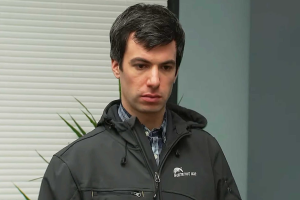Businessman and philanthropist Sam Belzberg, who the New York Times once called “one of Canada’s wealthiest and most controversial businessmen,” died on March 30 in Vancouver, after suffering a stroke several days earlier.
Belzberg, 89, was the chairman and CEO of Gibralt Capital Corp., which is based in Vancouver. In the 1980s, Belzberg established a reputation as a corporate raider known for his skill with the contentious practice known as greenmail, in which investors buy stock in a company, threaten a takeover and then drop the threat after the company agrees to buy back the shares at a premium.
Belzberg first became known outside of Canada in 1979, when he and his brothers, who were his business partners in the company First City, fought to take over the Bache Group, an American securities firm. The battle was covered in a front-page article in the Wall Street Journal in 1981 and the Belzberg brothers quickly became known as greenmailers, a characterization Sam Belzberg thought was unfair. In an interview with the New York Times in 1986, he denied the charge, saying he was simply a merchant banker “who takes advantage of situations and opportunities.”
After the “raider era” of the 1980s ended, Belzberg, who was then in his 60s, re-invented himself as a private equity investor, quickly amassing significant successes. Belzberg bought out and revived was The Keg restaurant chain. He also financed a Quebec-based vaccine manufacturer called ID Biomedical and took on real estate projects in Nova Scotia, California, Oregon and elsewhere.
In Belzberg’s later years, his fearsome reputation was largely forgotten, thanks to his generous philanthropy.
READ: VANCOUVER’S LOUIS BRIER HOME AT CENTRE OF ASSISTED DEATH CONTROVERSY
Belzberg’s parents immigrated to Alberta from Poland, just before many of their friends and family were sent to Nazi concentration camps. It was the immigrant experience that inspired him to help others
“Mom and dad lost so many of their brothers and sisters,” he told the Vancouver Sun in 2003. “Yet Canada took them in. This country takes people in, so why shouldn’t we help people? It’s our responsibility to help. I think about it every day.”
Belzberg headed the initial $13.5-million campaign to build Simon Fraser University’s (SFU) downtown campus in Vancouver, a space that has since become an integral part of the city’s urban life.
SFU president Andrew Petter told the Vancouver Sun that Belzberg will have a lasting legacy at SFU.
“Sam was a larger-than-life figure,” he said. “He was one of the builders of SFU.”
Sam was a larger-than-life figure.
– Andrew Petter
Belzberg also donated the initial $500,000 to start the Simon Wiesenthal Center in Los Angeles in 1977 and served as its founding chairman. “Sam was both a visionary and proud Jew,” Rabbi Marvin Hier, who founded the centre, said in a statement.
On top of that, Belzberg helped found the Yeshiva University High School of Los Angeles and was an active supporter of the Jewish community in Vancouver.
“Countless organizations in our community benefited from his vision and his philanthropy, including ours,” said Ezra Shanken, CEO of the Jewish Federation of Greater Vancouver.
“He had such a youthful energy about him and every time we met, he was always open to new ideas and new ways to help Jewish life flourish. He truly cared about this community and he appreciated others who valued tikun olam and tzedakah as he did. He and (his wife) Fran were a team and they have instilled those values in their family from one generation to the next.”
In 2001, Belzberg created Action Canada, which, in partnership with the federal government, endows 20 fellowships each year to Canadians “who want to make a difference in the world.”
He also founded the Dystonia Medical Research Foundation – a cause that was very personal to him. In the 1970s, Belzberg’s daughter, Cheri Belzberg, was diagnosed with the rare neurological condition, which impacted her mobility and speech. “Nobody knew the first thing about it in those days,” Belzberg told B.C.’s Jewish Independent in 2014.
Belzberg is survived by Frances Cooper, his wife of 68 years, his four children, 16 grandchildren and 12 great-grandchildren.






